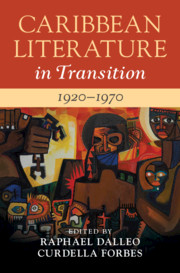Book contents
- Caribbean Literature in Transition, 1920–1970
- Caribbean Literature in Transition
- Caribbean Literature in Transition, 1920–1970
- Copyright page
- Contents
- Figure
- Contributors
- Introduction
- Part I Literary and Generic Transitions
- Part II Cultural and Political Transitions
- Part III The Caribbean Region in Transition
- Chapter 12 A Moving Centre
- Chapter 13 Canadian Routes
- Chapter 14 New Empires
- Chapter 15 Africa and the Caribbean
- Chapter 16 Cross-Caribbean Dialogues I
- Chapter 17 Cross-Caribbean Dialogues II
- Part IV Critical Transitions
- Bibliography
- Index
Chapter 16 - Cross-Caribbean Dialogues I
Hispanophone
from Part III - The Caribbean Region in Transition
Published online by Cambridge University Press: 16 December 2020
- Caribbean Literature in Transition, 1920–1970
- Caribbean Literature in Transition
- Caribbean Literature in Transition, 1920–1970
- Copyright page
- Contents
- Figure
- Contributors
- Introduction
- Part I Literary and Generic Transitions
- Part II Cultural and Political Transitions
- Part III The Caribbean Region in Transition
- Chapter 12 A Moving Centre
- Chapter 13 Canadian Routes
- Chapter 14 New Empires
- Chapter 15 Africa and the Caribbean
- Chapter 16 Cross-Caribbean Dialogues I
- Chapter 17 Cross-Caribbean Dialogues II
- Part IV Critical Transitions
- Bibliography
- Index
Summary
During the early twentieth century, hundreds of thousands of Anglo-Caribbean workers migrated to Spanish-speaking countries, but intellectual exchanges between the region’s anglophone and hispanophone writers remained few and far between. This situation changed above all as a result of the Cuban Revolution, which captured the imagination of a generation of writers and catalysed new networks through institutions like Casa de las Américas. These exchanges would be dominated by concerns with race and sovereignty, while sidestepping questions about Cuban communism and literary censorship. When Andrew Salkey attended the 1968 Cultural Congress in Havana with C. L. R. James and John La Rose, he portrayed Cuba as a symbol of regional anti-imperialism and interrogated the condition of Afro-Cubans, overlooking contemporary censorship scandals. The cross-Caribbean itineraries of Nicolás Guillén and Edward Kamau Brathwaite in the 1970s are emblematic of the cultural diplomacy of the time period. While Guillén’s reception foregrounded his writing on people of African descent and downplayed his commitment to communism, Brathwaite’s poetry was celebrated in Cuba but also subject to suspicion for its black radical content.
Keywords
- Type
- Chapter
- Information
- Caribbean Literature in Transition, 1920–1970 , pp. 258 - 275Publisher: Cambridge University PressPrint publication year: 2021



